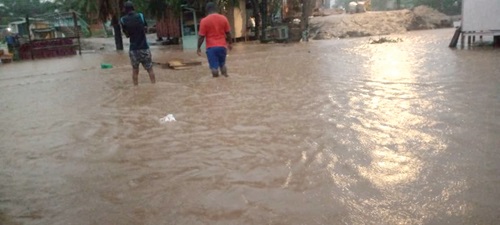Anytime dark clouds form over Alogboshie, a low-income community near Achimota in the Greater Accra Region, fear spreads faster than the gathering storm.
What should have been a blessing becomes a threat to the lives and property of thousands of residents.
Flooding in Alogboshie is no longer a seasonal inconvenience but has developed into a full-blown crisis.
For years, rapid and unplanned urbanisation, inadequate drainage systems, and poor enforcement of sanitation and construction regulations have made the community extremely vulnerable to floods.
“As a resident, I live in constant fear during the rainy season.
Each time it rains heavily, I worry about water entering my room and destroying my belongings,” Alberta Neequaye told this reporter.
That same fear is harboured by many in the community who often watch helplessly as floodwaters sweep through homes and the streets.
Situation
Historically, Alogboshie has open land with natural channels that help water flow freely. However, as years went by, those channels disappeared.
They are now replaced by buildings, kiosks, and shops, many of which have been put up without any proper planning or approval.
In response to complaints from residents, the Ga North Municipal Assembly constructed gutters in some parts of the community, but they are too narrow and shallow to contain the huge volumes of water.
Therefore, whenever it rains, the gutters overflow and water gushes out into nearby homes and shops.
Families lose furniture, clothing, food items, and in some cases, important documents in the process.
In some households, people have to remain awake throughout the night, ready to move valuables to higher ground if floodwaters enter their rooms.
The situation not only impacts residents financially, but also leaves them emotionally traumatised.
Statistics
According to data from the Ghana Meteorological Agency, Accra receives an average of about 730 mm of rainfall annually. However, recent patterns show that extreme weather events have increased in both frequency and intensity.
In 2023, the National Disaster Management Organisation (NADMO) reported at least 28 flood incidents across the Greater Accra Region, affecting over 15,000 residents.
Alogboshie may not have made national headlines, but the damage caused by each rainfall is devastating to those who live there.
The Ghana Statistical Service (GSS) classifies parts of the Alogboshie community as a high-risk urban zone due to inadequate drainage and overcrowded living conditions.
Appeal
Residents believe that piecemeal efforts are no longer enough to solve the flooding problem.
The community has, therefore, appealed to the Ga North Municipal Assembly and other relevant state agencies to expand and deepen all major drains in the area; stop unauthorised construction on watercourses and also introduce flood response teams for immediate support during emergencies.
They further called on the authorities to educate the public on proper waste disposal to avoid choking of drains and invest in green infrastructure to absorb excess rainwater and reduce runoff.
Policymakers
The flooding in Alogboshie is not just a natural disaster, it is a sign of failed planning and weak enforcement of building and sanitation policies.
While other communities in Accra face similar problems, those in poorer neighbourhoods often receive less attention.
Development has to be inclusive.
The authorities need to listen to the people on the ground and provide long-term and sustainable solutions.
As someone who lives through it, I believe it is time to speak up not only for myself, but for the mothers who lose their businesses, the schoolchildren who wade through dirty floodwaters often, and the elderly who cannot escape rising water quickly enough.
Our leaders can no longer ignore communities like Alogboshie.
The people are tired.
They want action now, for they certainly deserve better.

